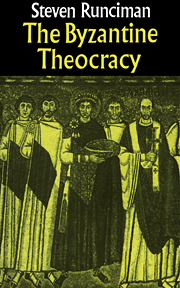Book contents
- Frontmatter
- Contents
- Foreword
- Introduction
- 1 The Christian Empire: The image of God upon earth
- 2 The Viceroy of God: The plenitude of Imperial power
- 3 The battle over images: The challenge of popular belief
- 4 The working compromise: The limits of Imperial control
- 5 The monks and the people: The opposition to the palace and the hierarchy
- 6 Decline and fall: The end of the Kingdom of God on earth
- Notes
- Index
Introduction
- Frontmatter
- Contents
- Foreword
- Introduction
- 1 The Christian Empire: The image of God upon earth
- 2 The Viceroy of God: The plenitude of Imperial power
- 3 The battle over images: The challenge of popular belief
- 4 The working compromise: The limits of Imperial control
- 5 The monks and the people: The opposition to the palace and the hierarchy
- 6 Decline and fall: The end of the Kingdom of God on earth
- Notes
- Index
Summary
The aim of this short study is to give an account of an Empire whose constitution, to use too legal a word, was based on a clear religious conviction: that it was the earthly copy of the Kingdom of Heaven. Many tribes and nations have seen themselves as being the favoured children of God or His special elect. Wherever monarchy has been established the monarch was always in the beginning either an emanation of God or a descendant of God, or at least His High Priest, the man appointed by God to look after the people. But the Empire which we call for convenience Byzantine maintained a larger conception. It saw itself as a universal Empire. Ideally it should embrace all the peoples of the earth, who, ideally, should all be members of the one true Christian Church, its own Orthodox Church. Just as man was made in God's image, so man's kingdom on earth was made in the image of the Kingdom of Heaven. Just as God ruled in Heaven, so an Emperor, made in His image, should rule on earth and carry out His commandments. Evil had made its way into God's creation, and man was stained with sin. But if the copy – the Greek word was mimesis, ‘imitation’ – could be achieved, with the Emperor and his ministers and counsellors imitating God with His archangels and angels and saints, then life on earth could become a proper preparation for the truer reality of life in Heaven. The Byzantine Empire lasted for eleven centuries, most of them centuries of decline: till in the end the Emperor ruled over little more than a decayed city-state.
- Type
- Chapter
- Information
- The Byzantine TheocracyThe Weil Lectures, Cincinatti, pp. 1 - 4Publisher: Cambridge University PressPrint publication year: 1977



